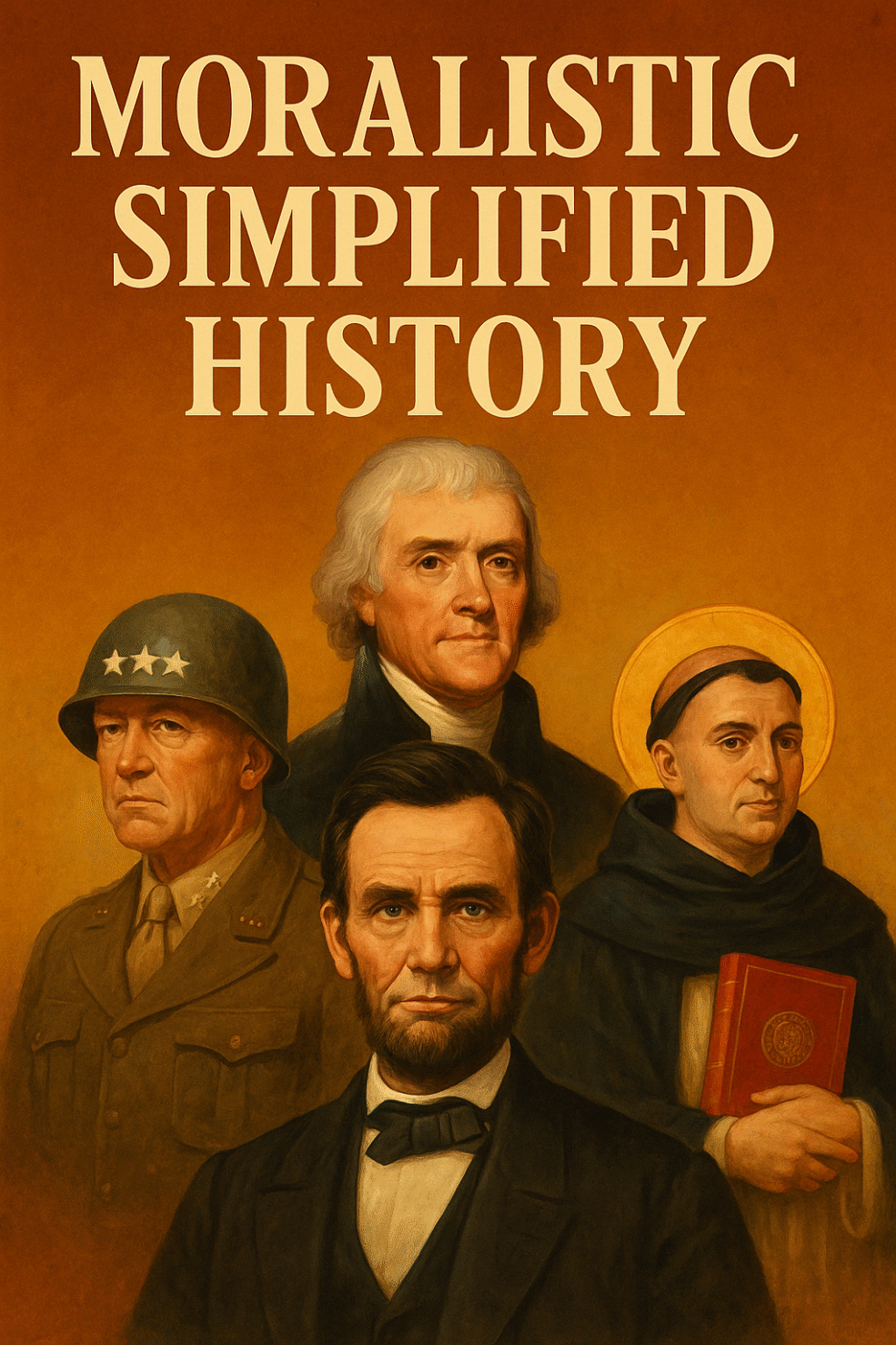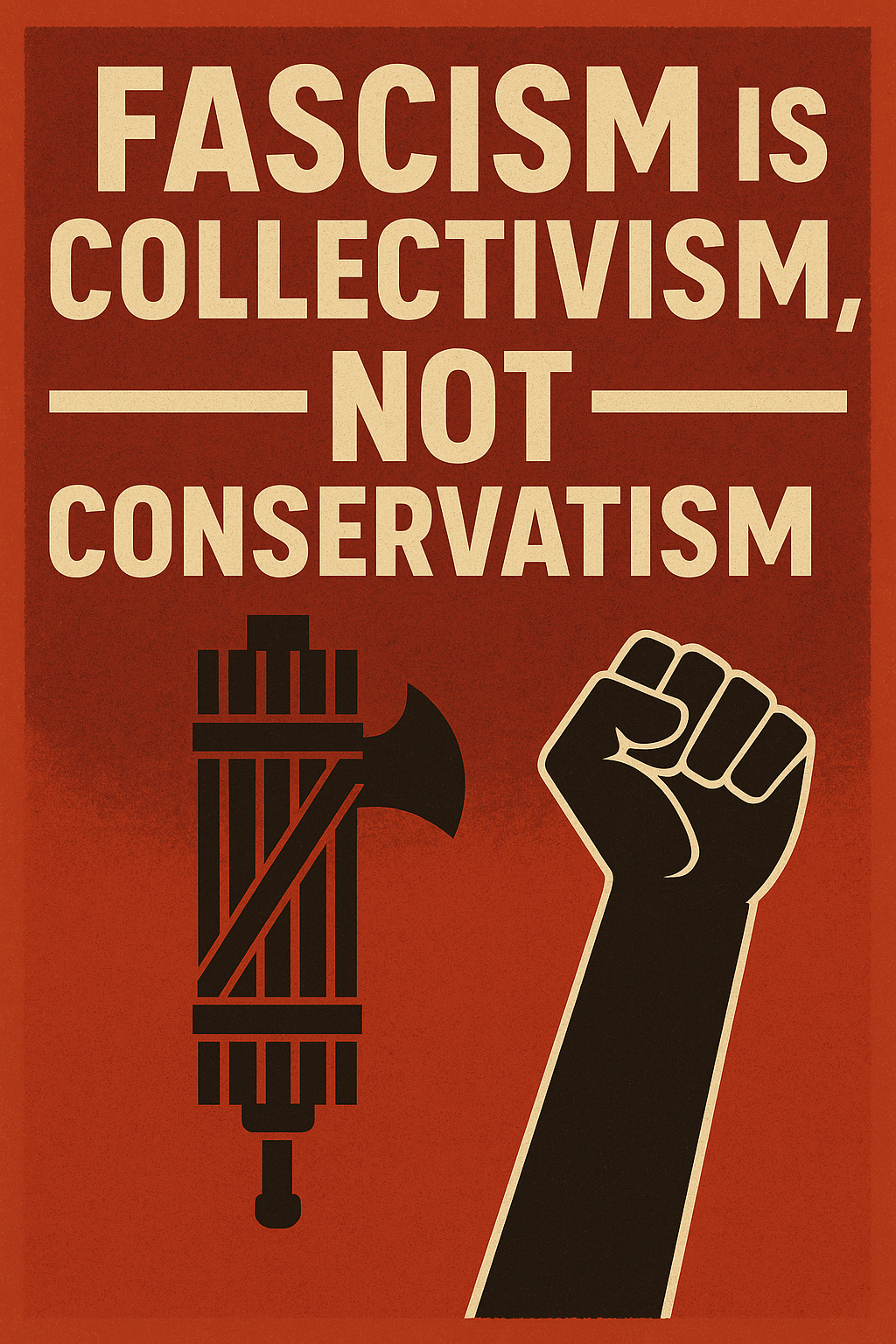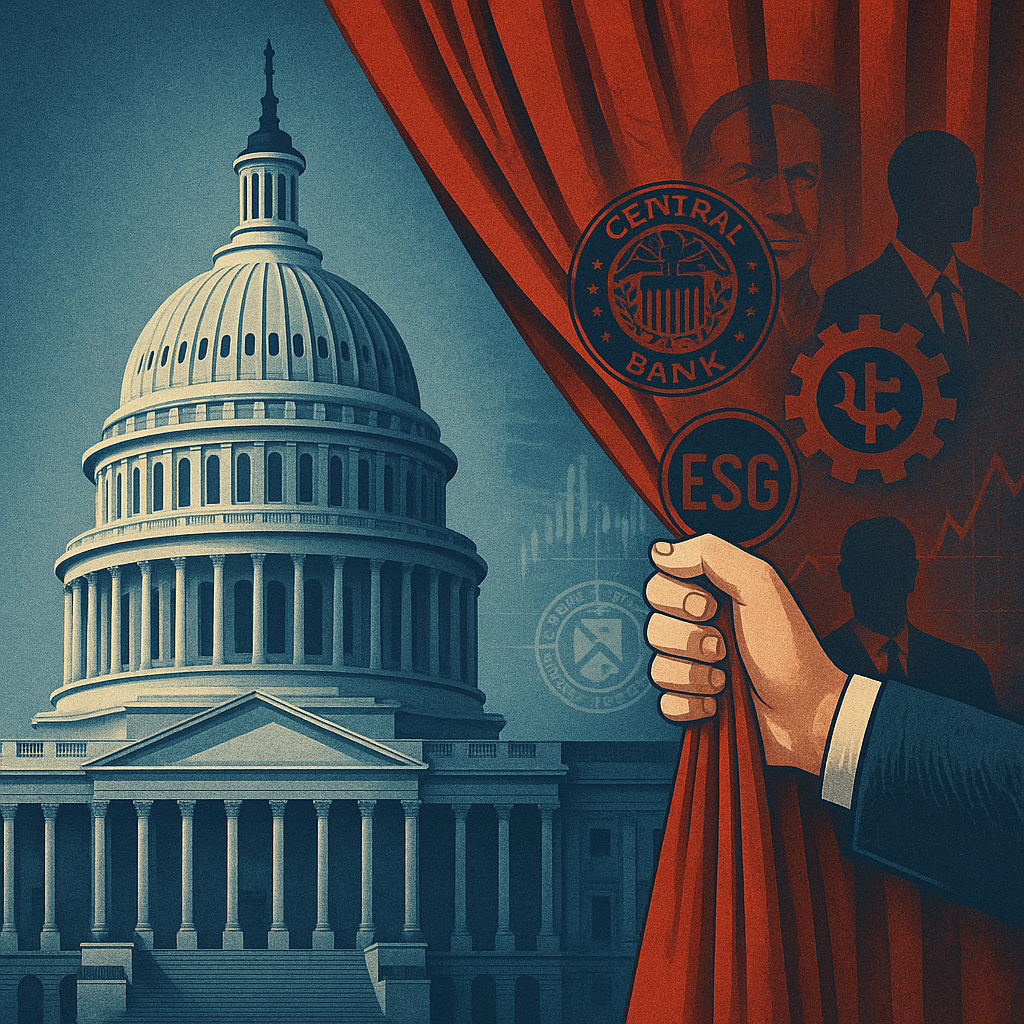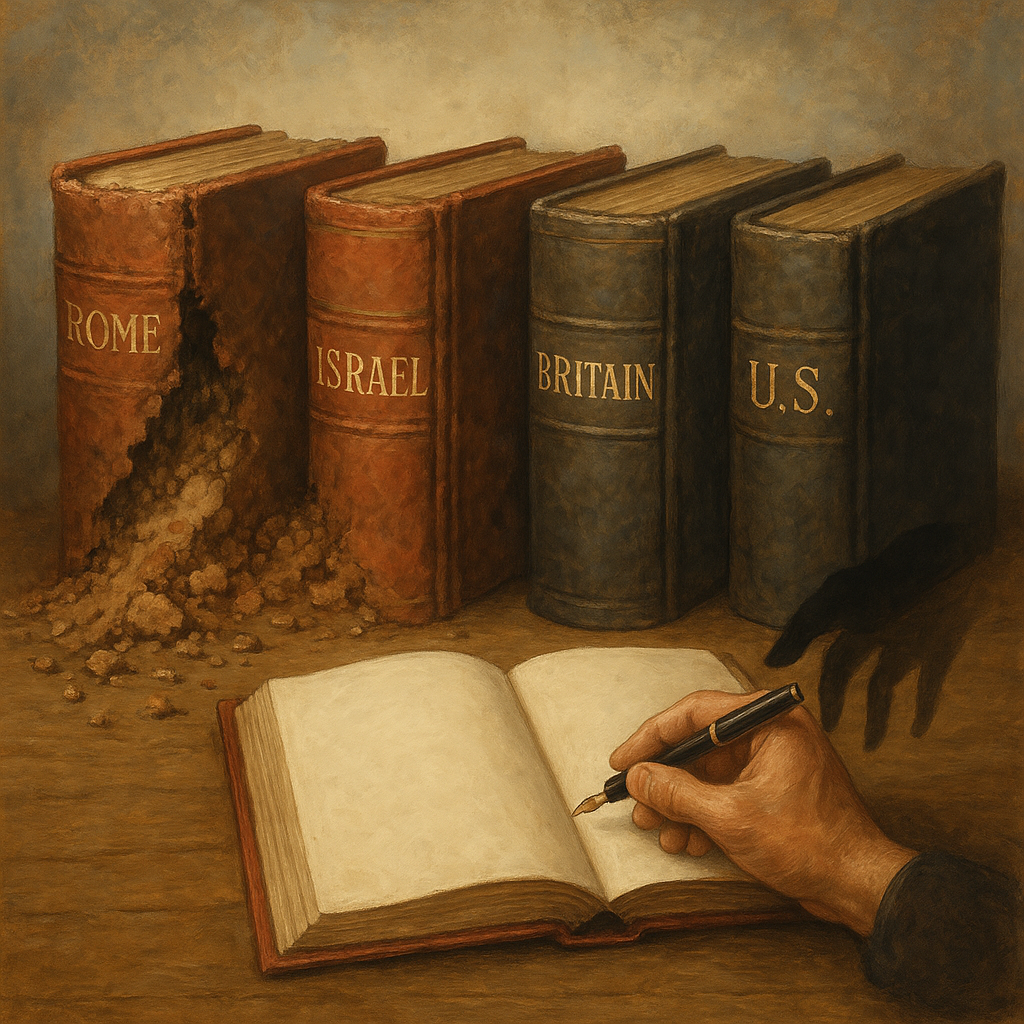We like to believe that history is a morality tale: that the past was a battle between good guys and bad guys, or heroes and villains. This comforting lie has become the foundation of modern Western self-understanding, but it is a lie, and it is leading us toward ruin. The political left, in particular, has reframed history through a lens of moral purity, using it not to learn from the past, but to reshape the present, and in doing so, it is laying the groundwork for civilizational collapse. I am going to expose that lie, and show how our unwillingness to confront historical nuance is leading the West to destroy itself.
I call this process of over-simplifying history, to use it as a political weapon rather than to learn from it, “Moralistic Historical Simplification.”
Let’s hit the big one first: slavery. For starters, slavery was never a federal institution. In America, slavery was an institution of individual states. The Constitution did not legalize slavery; it only tolerated it. And that distinction matters. In 1789, insisting on moral purity would have shattered the fragile coalition that allowed the United States to form in the first place.
The Founders chose union over moral absolutism not because they supported slavery, but because they knew that no union meant no future, and no eventual hope of ending slavery at all.
Some slave owners, such as Thomas Jefferson, were also abolitionists, but were trapped in an economic system they were born into (one they did not choose). As Governor of Virginia, Jefferson tried to ban slavery across the entire state. This failed by two votes. As a U.S. Congressman, he tried to get a federal ban on slavery in any new state that joined the Union. This failed by one vote. As President, Jefferson banned the importation of any new slaves.
What Thomas Jefferson understood was that any plantation operating without slaves would go out of business and be taken over by someone who used slaves, unless no plantation was allowed to use them. If all plantations were banned from using slaves, costs would rise – but on all plantations – so no one would be at a relative disadvantage.
Unfortunately, the plantation system was one in which each plantation borrowed heavily early in the year for spring planting, and then, in a good year, paid off its debts at the end of the year.
The land plantations sat on was neither liquid nor valuable enough to be used as collateral for those loans, so plantations used their slaves as collateral. This means that in addition to banning slavery across the board, eliminating it without destroying the entire Southern economy would have required some framework where plantations could borrow for spring planting using land alone as collateral.
A national system of lending, in which the federal government created a land bank, or some other kind of government-backed loan system, could have replaced the need to use slaves as collateral. But it would have required a constitutional amendment, and the simple reality is that there was no support for such a program in either the North or the South.
This brings us to the next bit of important nuance: the Civil War was not inevitable.
The truth is that while slavery was the catalyst of the Civil War, it was not the cause.
After Lincoln was elected, seven states seceded from the Union, all of them citing the preservation of slavery as the reason. South Carolina opened fire on Fort Sumter, and Lincoln arrested much of the Maryland legislature to prevent Maryland from seceding, while raising an army to invade the South.
Virginia, North Carolina, Tennessee, and Arkansas seceded not to preserve slavery, but because of Lincoln’s reaction to Fort Sumter.
Let’s play a slight historical “what if” scenario to illustrate how the war could have been avoided.
In our scenario, either South Carolina does not fire on Fort Sumter, or it does, but Lincoln figures that since nobody was killed he can de-escalate the situation. Virginia, North Carolina, Tennessee, and Arkansas stay in the Union, but the Upper South and several other border states could still go either way should war break out.
Let’s say that instead of preparing for war, Lincoln offered to create the federal land bank we discussed earlier, and in return slavery would be abolished. In the face of a civil war, there might have been enough support to get this passed. Crisis creates strange bedfellows, and it is hard to imagine the Deep South starting an armed conflict without North Carolina and Virginia, two of the most populous Southern states, Virginia, in particular, being the most populous state in the South at the time.
Such a compromise could also have been reached at any time during the war, such as after General Burnside’s disastrous Union defeat at Fredericksburg.
Tempting as it is to blow this “what if” scenario off with, “It didn’t happen,” understanding that it could have happened had cooler heads prevailed might help us avoid a future civil war. With many political commentators saying we are already in a cold civil war, understanding only the moral posturing surrounding the Civil War does nothing to calm tensions in the here and now, whereas understanding nuance might help us find compromise today. The lessons are in the nuance, so when we break from Moralistic Simplified History, we let the lessons of history breathe again.
Let’s move on to another piece of history begging for more nuance: fascism was not inherently racist, and fascism did not die in 1945.
Fascism continued for decades after WWII, in Spain under Franco and Portugal under Salazar, neither of which was built on racial ideology.
Only Nazi Germany fused fascism with racial purity. Franco’s regime, for example, was hierarchical, Catholic, corporatist, and not racist. To claim fascism is defined by racism is to make all fascists Nazis, erasing history in favor of ideological shorthand.
The political left admired the economics of Franco’s Spain, which included state control over industry, tight wage and price controls, and corporatist central planning. The left believed this produced stability and growth, so though everyone disapproved of Franco’s politics, left-leaning Western observers were enamored with his results.
The economics of fascism, incidentally, sound a lot like John Maynard Keynes.
Franklin Delano Roosevelt sent envoys to Mussolini’s Italy, to see what could be done to bring Mussolini’s economic model to the United States. These envoys helped shape the National Recovery Act, which was later ruled unconstitutional by the Supreme Court. FDR then tried and failed to stack the Court to change that. In our day, Elizabeth Warren re-drafted much of that thinking into her Accountable Capitalism Act, which is little more than a retread of Mussolini’s economic vision – the economic engine of fascism.
Here is yet another nuance: “left” and “right” are not universal terms.
Under Moralistic Simplified History, Hitler is labeled “right-wing” because he came out of the right wing of German politics, but Germany was set up by Otto von Bismarck in 1871 as a socialist state, such that in any American context, Hitler’s policies, including state control over industry, mass censorship, and racial identity politics, would be leftist.
Political orientation is highly relative to local context. Pretending otherwise lets ideological deception masquerade as moral clarity, and is one reason the political left is walking blindly into fascism today, despite claiming to oppose it.
In economic terms, Canada and much of Europe fit the definition of fascism today. Throw in the collapse of free speech in those societies, and they are closer to fascism in the political sense then they would care to admit. Worse yet – their leaders probably know it.
Here is an even bigger piece of nuance that is important in our day: Hitler thought he was a hero.
Evil generally does not know it is evil. Hitler believed he was saving Germany and saw himself as a moral reformer. He would even rant about how he was the only person virtuous enough to save the nation.
It is dangerous to teach history as a simple fight between good and evil. If we believe evil always presents as obviously monstrous, even to those within it, it becomes hard to recognize when cloaked in moral language, as is happening today.
Before we leave WWII, I might add yet another piece of uncomfortable nuance: we might well have sided with Hitler if he had invaded the Soviet Union without first invading Poland (although it would have been difficult for Hitler to do based on Poland’s geographic location). In truth, Hitler was seen by many Western elites as a useful check on Stalin.
As for who was worse between Hitler and Stalin, General George S. Patton probably put it best when asked by a reporter what he would do if he were in a room with Hitler and Stalin, and he had a gun with only one bullet. “I’d shoot Hitler and bludgeon Stalin to death,” Patton said, adding after a pause, “Come to think of it, I’d probably bludgeon Stalin even if I had two bullets.”
The choice between Stalin and Hitler brings up yet another important piece of nuance that is often missed: leaders must choose among options actually available to them, and in many cases all of them are bad.
We rate ourselves very poorly in foreign relations based on the poor choices our country often makes, but history often forces leaders to pick between bad and worse. Judging those choices, or the people making them, without considering the constraints faced is dishonest.
Jefferson tolerated slavery. Lincoln chose war. Lee chose Virginia.
And we picked Stalin.
These were not clean moral choices, but strategic decisions made under immense pressure. Simplified history ignores that reality.
And for those who want to know why our country voted for Trump, this is precisely why.
Let us move on to yet another important nuance: the modern left rejects cause and effect relationships.
Today’s left operates as if moral purity is more important than actual outcomes. They demand idealism in the face of complexity and refuse to consider how real systems function. Over and over again, the left moralizes poverty, identity, climate, and speech, without engaging in tradeoffs, incentives, or consequences. Their ideology is metaphysical, not practical.
“Nobody should be hungry in the wealthiest nation on Earth” is a moral platitude – not a plan.
The UN, the WEF, and other elite-driven institutions promote narratives of justice, sustainability, and equity, just as our left does, but their systems do not work. Europe is crumbling under energy costs and immigration. Canada is suffocating under speech codes and state media. These systems fail in practice, but the people living there are not allowed to say so. That alone should tell us something.
Here’s some nuance: China helped write the script.
China has spent decades promoting anti-Western propaganda, encouraging the very narratives that divide and paralyze Western nations. Ironically, in doing so it has undermined its own customer base – without first building a viable internal replacement.
China helped the West hate itself, never realizing it needed a strong West to survive, and now, as globalist nations become poorer, China is left with only the United States as a viable place to sell its products.
Let’s bring nuance to Islam, because what the left exhibits here is ‘suicidal empathy’.
We don’t embrace Islam in the West because it’s good. We embrace it because we’ve been trained to hate ourselves. That’s it. The left’s reflexive empathy has been so warped by its own guilt that it can’t distinguish between tolerance and surrender. Islamists have figured that out. They don’t even hide it. They use our protections against us. They call it religious freedom while openly preaching conquest. They weaponize our institutions while claiming victimhood. They don’t have to beat us. We’re beating ourselves.
I’ve focused on the left in this article, but the right does the same thing. Barack Obama really was born in Hawaii. And now there’s a growing movement on the right – often called the ‘woke right’ – that mimics the left’s worst habits, exaggerating victimhood and hollowing out the middle with the same tribal mindset.
The West is being destroyed by a single lie at the center of it all: the belief that history is simple, and that it can be broken into oppressors and oppressed, good guys and bad guys. This lie has infected our politics, our schools, our media, and our institutions, and now, it is unmaking the very civilization that once defined liberty.
Moralistic Historical Simplification creates a culture that cannot think. It reduces complex realities to slogans. It empowers authoritarians who claim moral superiority. And it disables the West from solving any of its real problems. If we want to survive, we must first learn how to remember, honestly, fully, and without fear.
Truth is not always clean. But it is always necessary.
And unless we understand nuance, history repeats itself.







